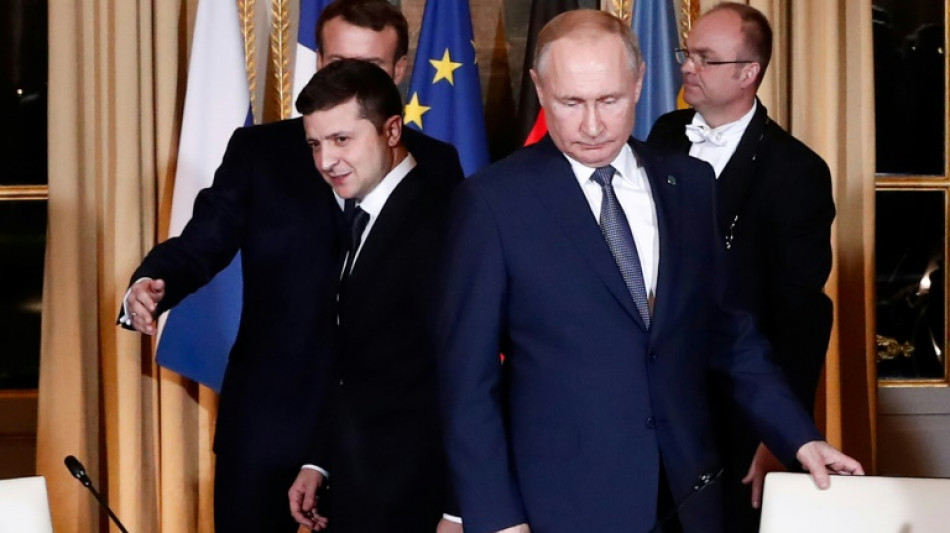
The agent and the comic: Putin, Zelensky in fight for Ukraine

One is a former comic actor who became president in 2019 as a political novice. The other a one-time KGB agent now in power for over two decades.
Ukrainian President Volodymyr Zelensky and Russian President Vladimir Putin were both born in the Soviet Union and share the same first names. But the similarities end there.
The bitterly personal confrontation between the two men is at the heart of Russia's invasion of Ukraine, with their personal and political futures at stake along with the fate of the country.
Zelensky, 44, hunkers down in central Kyiv amid the Russian bombardment at intimate quarters with his protection squad and closest aides.
Putin, 69, meanwhile sits in the Kremlin receiving visitors according to the strictest protocols, with the distance he sits even from close ministers at giant tables mocked on social media.
The two men have met face-to-face only once -- when French President Emmanuel Macron hosted them along with then-German Chancellor Angela Merkel for talks in Paris on Ukraine in December 2019.
Since then, Zelensky has become such an implacable enemy of Putin that the Russian president never refers to him by name, just like his main domestic opponent Alexei Navalny.
Putin instead refers to the Jewish president, who was elected in 2019 polls and widely admired by the international community, as the head of the "Kyiv regime" or the leader of a "gang of drug addicts and neo-Nazis."
Macron, in an address to the nation late Wednesday, drew a stark contrast between the two men saying Putin "chose war" while Zelensky is "the face of honour, freedom and courage".
- 'Servant of the people' -
While Putin was consolidating his control over Russia in the first years of the new millennium, Zelensky was establishing his production company Kvartal 95 and a reputation as one of Ukraine's most prominent showbiz personalities.
Just over a year after Putin annexed the Ukrainian peninsula of Crimea and backed separatists in the country's east, Zelensky in 2015 began starring in the show that propelled him to stardom.
The comedy drama was called "Servant of the People" and tells the story of Vasyl Holoborodko -- played by Zelensky -- a history teacher who becomes president after a rant about corruption goes viral.
In one episode, the Holoborodko receives a call from German chancellor Angela Merkel congratulating Ukraine on joining the European Union and skips with joy -- only to be told she has called the wrong number and meant to call Montenegro.
This week Zelensky -- the real president that is -- signed the application for Ukraine to join the EU.
In 2019, with the country's politics in turmoil, Zelensky entered the fray and won the presidential elections in a landslide, calling his party "Servant of the People".
His election was greeted coolly by the Kremlin and Putin, who never showed much interest in engaging with Zelensky, even after the 2019 Paris summit.
In an address to the nation hours ahead of the Russian invasion, Zelensky said the Kremlin had not responded to a request for telephone talks in a grim indication that war was near.
Zelensky's years in power even before the war had by no means been untroubled, with accusations from critics at home that he lacked experience, employed his former business partners as top aides and had built up offshore wealth.
But as a wartime leader he has excelled, giving almost daily video addresses dressed in a T-shirt and with growing stubble to show he has remained in Kyiv despite the bombardments.
- 'Go home' -
While Zelensky has taken cheery selfies with his ebullient defence minster, Putin has cut an increasingly isolated figure with even his Defence Minister Sergei Shoigu -- a close friend and holiday companion -- kept at a distance at the other end of the notoriously long Kremlin table.
Stewart Patrick, senior fellow in global governance at the Washington-based Council on Foreign Relations, said Putin had succeeded in turning Zelensky into "an international hero".
"There is nothing more threatening to a despot, it seems, than a functioning (if imperfect) democracy next door."
Time magazine even put Zelensky's comments from an address in Ukrainian to the EU parliament this week on its front cover -- "Zhittya permozhe smert - a svit temryavu" (Life Will Win Over Death - Light Will Win Over Darkness).
French foreign minister Jean-Yves Le Drian said Thursday that Putin wished for the "negation of Ukraine" to avoid having "democratic models on his doorstep".
Zelensky has said he fears he is the number one target of the Russian invasion but on Thursday also called for talks with Putin as the only way to end the conflict.
"If anyone thinks... Ukraine will surrender he knows nothing about Ukraine and has nothing to do in Ukraine," Zelensky said in his latest video address in an apparent message to Putin.
"Go home. To your home," he said.
T.Allen--TNT